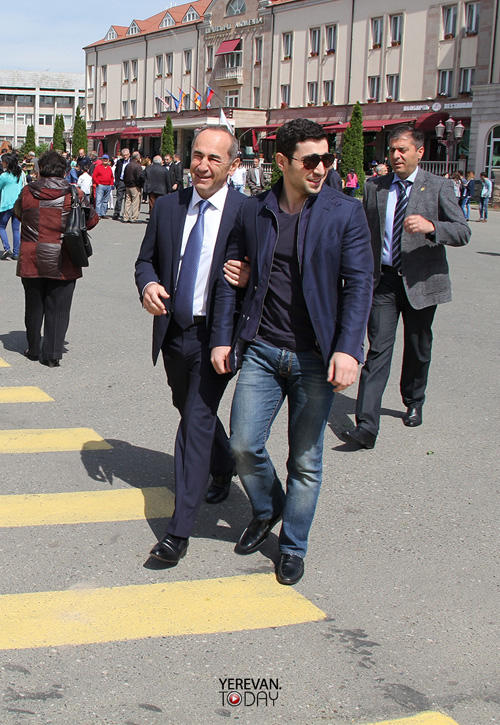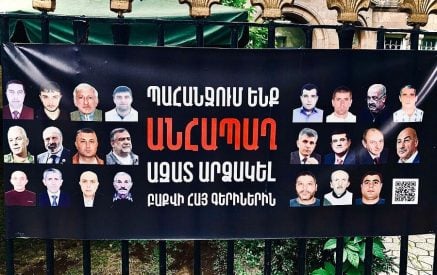What would Kocharyan have done if the armed group had occupied a state facility building during his tenure?
Armenia’s second President Robert Kocharyan has given an interview to “Liberty” RFE/RL radio station. He is again concerned about Armenia economically rolling down the abyss, he speaks about “the legitimate electoral processes.” This is said by a man who in 1998, 2003 and 2008 presidential elections, has thrown the possibilities of Armenia’s development back to kilometers. But we have already become accustomed that from time to time we must hear some interviews from Kocharyan about his brilliant period in power, some recalling about his past of how “the country is intensively developing” during his term in the office. Which was the glorious period of his term in power? As a result of Kocharyan’s conducted complementary foreign policy, Armenia’s strategic objects were handed over to Russia, particularly, in the framework of “Property for Debt”, for the debt of 113 million dollars. Several companies were handed over to Russia: the Mergelyan (the Institute of Mathematics) Institute in Yerevan, Hrazdan thermal power plant without the fifth block (it was later sold to Russia), Mars plant (for the debt of a total of 113 million dollars).
Almost the entire energy system of Armenia was handed over to Russia during Kocharyan’s tenure. In addition, Kocharyan appeared to be so complimentary that handed over the Iran-Armenia small diameter gas pipeline to Russia, as a result, Armenia was deprived of any possibility of weakening the position of Russia’s monopoly. The solid grounds of Russian monopoly policy in strategic sectors of Armenia were laid down during Kocharyan’s tenure, and what developments they provided for our country. Today, we must remind Kocharyan who sees the need for “legitimate electoral processes” that because of the 2008 presidential elections and the subsequent events of March 1, the “Millennium Challenge” program was terminated, a program that was aimed at reconstruction of 350 kilometers of rural roads in Armenia, with the budget of about 68 million dollars.
Read also
As for the Nagorno-Karabakh conflict, Kocharyan who left Nagorno-Karabakh out from the negotiation process, early a palace coup in 1998, allegedly displeased with the “defeated” stance of Ter-Petrosian on Karabakh matter, promised to settle the Karabakh conflict by package “triumphal” version – to create an independent Karabakh on 8 thousand square kilometers. Today, Kocharyan announces that the April war must harden our positions on the Karabakh settlement process rather than weaken them. “… First of all, by security guarantees and tough correlation of referendum, return of a part of controlled territories.” Then, he blames the current government’s readiness to make overly concessions, saying, “… Judging by the statements of officials of the parties in conflict, as well as from the numerous publications of pro-government mass media, the readiness of the parties to make concessions is strongly unproportionate. This readiness of the Armenian side is too emphasized, at the same time there are even no hints of making concessions on principle issues for us in Azerbaijan.”
Later, he recalls that during the ten years of his presidency, we were close to signing the document only once in Key West, where Azerbaijan refused, “It was a package and a comprehensive settlement which underlay the joining of NKR to Armenia and assumed return of territories, as well as the use of complex measures for ensuring the security”. In short, it was a period of perfection during Kocharyan’s tenure on Karabakh issue and now, he deems it necessary to offer solutions. If another person had presented these proposals, who officially had not negotiated with the Azerbaijani authorities, one could find totally logical observations in his estimates.
But interestingly, in the period of his power when Azerbaijan was not so unbridled, there was no April four-day war and Safarov’s glorification in Azerbaijan at the state level, the balance of forces was not broken, so on what proposals Kocharyan was negotiation with Azerbaijan. It is remarkable that Kocharyan, in fact, is proud of his negotiated proposals. Those who have forgotten Kocharyan’s glorious negotiated proposals on Karabakh settlement, let us remind them, incidentally, emphasizing that these versions, according to Kocharyan, were presented in the period when Azerbaijan’s actions, the degree of its aggressiveness and the level of distrust was quite different, Armenia was ahead of Azerbaijan “both by reforms and foreign political activity”, in other words, according to him, Armenia was the party with strong positions rather than Azerbaijan.
Now, let’s see to what extent Kocharyan’s negotiated proposals are Armenophile for Armenia and Artsakh. In November 1998, the OSCE Minsk Group co-chairs presented Armenia, Azerbaijan and NKR the proposals for the settlement called a “Common state”, which Yerevan and Stepanakert accepted it with reservations, while Baku rejected it.
Although Kocharyan had promised to regulate the Nagorno-Karabakh conflict by a package, a “triumphant” version, and to establish an independent Karabakh on 8 thousand square km area. Now, let’s go back to the 1998 “Common State” proposal presented during Kocharyan’s presidential tenure. The “Common State” was a phase version, because this document was resolving only the status of Nagorno-Karabakh, whereas the status of Lachin was left for the future. In other words, the definition of the status for Lachin, which is the most serious guarantee for the security of Nagorno-Karabakh, is moved to the second phase. If in the 1997 phase version, it was managed to avoid the principle of corroboration of Azerbaijan’s territorial integrity, then in the “Common State” versions, Nagorno-Karabakh was corroborated as part of Azerbaijan. The clause corroborating Azerbaijan’s territorial integrity was defined as following, “Nagorno-Karabakh is a state-territorial formation in the form of a Republic and constitutes a common state with Azerbaijan in the latter’s internationally recognized borders.” In addition, various clauses of this version defined Nagorno-Karabakh’s vertical subordination to Azerbaijan, i.e. the principle of actual independence of Nagorno-Karabakh was significantly weakened by the 1997 package version, by more closely connecting Nagorno-Karabakh to Azerbaijan. Thus, according to the “Common State”, Nagorno-Karabakh should have a national guard (security forces) and police forces that would be formed on a voluntary basis, while according to the 1997 package version, NK would have a National Guard and police forces, and the citizens of Karabakh would have the right to pass the service in the territory of Nagorno-Karabakh. Next, according to the 1997 package version, Nagorno-Karabakh could have its independent representation in different countries, whereas according to the “Common State” version, it could act only operate through the representations of Azerbaijan. In other words, with this provision, NK foreign relations’ right was equaled to zero. Next, according to the “Common State”, Nagorno-Karabakh would form a free economic zone, have the right to its own currency issue, which will circulate equally with Azerbaijani currency issue, whilst according to the 1997 package version, Nagorno-Karabakh would form a free economic zone with “free circulation of currencies.” The next most important fact is that by the “Common State” version, Armenia and Nagorno-Karabakh, in fact, were admitting the territorial integrity of Azerbaijan, since the authorities of Armenia had not made any reservations on this topic in their official response, being limited only to this wording, “they will refer to them in the course of negotiations”. Whereas in response to the 1997 package version, the official Yerevan stated that it does not accept the principle of Azerbaijan’s territorial integrity and does not recognize it a subject for discussion, whilst the 1997 phase version did not contain the principle of Azerbaijan’s territorial integrity at all. A question may arise, in that case, why Azerbaijan rejected the “Common State” proposal if it was so Armenophile. The explanation is very simple. Azerbaijan’s appetite was bigger, and the expectations from Kocharyan were more. Later, we got convinced – the formation of the corridor linking Nakhichevan to Azerbaijan through Meghri became the subject for discussion and under Kocharyan’s tenure, the ill-fated “Meghri version” emerged.
Some time later, the idea of creating a corridor connecting Nakhichevan to Azerbaijan thru Meghri, the notorious “Meghri option” – exchange of territories, was already disclosed. In April 2001, under the auspices of the US Secretary of State, Colin Powell, the “Key West” round was over by Robert Kocharyan- Heydar Aliyev talks held in Key West. A new round of negotiations launched in 2004, which was called a Prague process. And in November 2007, at the OSCE Ministerial meeting in Madrid, Armenia and Azerbaijan were presented a framework document consisted of 14 elements, based on the philosophy of referendum.
Today, they were the Madrid principles laid down on the table of Karabakh negotiations, which are also unacceptable for Kocharyan. Kocharyan’s 10-year tenure was the period of October 27, Poghos Poghosyan’s and other senior officials’ mysterious murders, arrested media and repression, leaving Armenia out of the regional programs and a number of negative reports and resolutions for Armenia and Artsakh, with which he, in fact, is proud of.
How did the last days of “legitimate electoral process” admiring Kocharyan’s tenure end? After “cleaning” the Liberty Square early in the morning of March 1’08 by using a force against the peaceful demonstrators, opening a fire against the crowd gathered in the center of Yerevan in front of thousands of people in the evening of the same day, and after the killing of 10 innocent people, Yerevan was declared an emergency situation for the terms of 20 days starting from March 1, several dozens of people appeared in the jail. Indeed, it was a “glorious” period: the years of 1998-2008. And what would Kocharyan have done if the armed group had occupied a state facility building during his tenure? … The question is rhetorical.
EMMA GABRIELYAN
“Aravot”, 06.09.2016



























































